|
|
|
Sort Order |
|
|
|
Items / Page
|
|
|
|
|
|
|
| Srl | Item |
| 1 |
ID:
134162
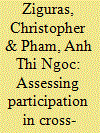

|
|
|
|
|
| Publication |
2014.
|
| Summary/Abstract |
One of the limitations of research on global educational mobility has been the primary classification of key participants - students and educational institutions - in national terms. This paper tests the challenges involved in such methodological nationalism by examining the provision of cross-border education in one city. As Vietnam's commercial centre, Ho Chi Minh City (HCMC) has experienced rapid transformation over the past two decades as the country has moved steadily from a state-directed to a more market-driven and globally integrated economy. Since the late 1990s there has been a parallel growth in cross-border higher education in HCMC, through the outbound mobility of students and the provision of foreign programmes by international partnerships and branch campuses. Drawing on available data supplemented with insights gleaned from interviews and existing literature, this paper develops a methodology for identifying and quantifying the key features of each form of domestic, overseas and transnational provision. We estimate that around 6% of HCMC's tertiary students are studying overseas and between 2% and 3% in foreign programmes delivered in the city. The rates of enrolment in overseas and transnational programmes by students in HCMC are thus far higher than for Vietnam as a whole, but still considerably lower than in those well-established cross-border education hubs, Hong Kong and Singapore. We argue that concerns about the growth of private education and inequalities in access may continue to limit the growth of transnational provision in HCMC.
|
|
|
|
|
|
|
|
|
|
|
|
|
|
|
|
| 2 |
ID:
134160
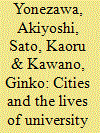

|
|
|
|
|
| Publication |
2014.
|
| Summary/Abstract |
Although the relationship between cities and universities is a commonly discussed topic, the so-called 'world class universities' and 'global cities' in East Asia do not always fit into one single cosmopolitan model. Focusing on the case of Tokyo and Japan, the authors of this paper examine the mobility patterns, academic and social lives, and gender differences of university academics as representative knowledge workers. Using original survey results, the authors first create a hierarchical structure of academic mobility patterns in Japan, and then argue that Tokyo, as the capital of Japan, is a centre of the intellectual network through its education and training function
|
|
|
|
|
|
|
|
|
|
|
|
|
|
|
|
| 3 |
ID:
134164


|
|
|
|
|
| Publication |
2014.
|
| Summary/Abstract |
Over the last decade, international education initiatives and higher education restructuring in various parts of the world have been increasingly entangled with national knowledge economy policy and urban growth projects. The ensuing entanglements have been more or less 'policied' by what might be termed 'educity imaginaries', which have taken spectacular material form in some global cities. In this paper, we explore the working out of educity imaginaries in Auckland against the backdrop of shifting investment trajectories and the global mobility of educity policy. We argue that globalising imaginaries have intersected with local policy legacies and political economy to produce a mix of mundane and promissory imaginaries. We examine the frictions generated in these encounters and the ways in which they are reworked as resources in local city-making. Working from a commitment to enactive research, we argue that Auckland City might make much more of the possibilities opened up by 'educity imaginaries'.
|
|
|
|
|
|
|
|
|
|
|
|
|
|
|
|
| 4 |
ID:
134158


|
|
|
|
|
| Publication |
2014.
|
| Summary/Abstract |
In a context of growing global interconnectivity, policy makers and academics increasingly see knowledge as an essential part of the economic and social development of cities (Bathelt et?al., 2004; Storper and Venables, 2004). Because the economies of large cities are the drivers of the national economy, urban universities are often identified as a key institution and major impetus for the creation of knowledge in the city economy: universities are viewed as spaces for innovation and developing industry linkages, as part of the broader reputation of cities themselves and as sites for the training of future skilled workforces (McCarney, 2005; Goddard and Vallance, 2013). Universities are also an important dimension of the broader urban fabric, having impacts on local economies and geographies, and employing and educating large numbers of faculty, staff and students (Wiewel and Perry, 2008). The presence and practices of domestic and international students are significant not only within the bounds of the campus but also as 'urban agents' involved in the transformation of urban landscapes (Collins, 2010). Housing and the broader urban environments within which students live and study have become an important focus for policy and strategies within local government and universities themselves (Smith, 2008; Fincher and Shaw, 2009).
|
|
|
|
|
|
|
|
|
|
|
|
|
|
|
|
| 5 |
ID:
134167
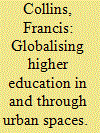

|
|
|
|
|
| Publication |
2014.
|
| Summary/Abstract |
This paper explores the connections between universities and cities in a moment of heightened emphasis on international student mobilities and globalising processes in Asian higher education. In particular, I seek to draw attention to the contingent assembly of the urban and its role in globalising higher education by highlighting the ways in which urban spaces draw together different sorts of trans-local connections and flows. To explore this approach, I discuss the globalisation of higher education in South Korea, and the significance of Seoul in these processes through a focus on two leading universities - Korea University and Seoul National University. To highlight the importance of trans-local connections in the urban dimensions of higher education, I discuss the generation of desires to be mobile in imaginations of Seoul as a destination for higher education, student experiences of situated learning in place and the articulation of student mobilities into career pathways with Korean transnational firms. From this perspective urban spaces need to be understood as much more than just the geographical backdrop to the globalisation of higher education. Rather, cities like Seoul are the spaces through which connections are being forged around knowledge production, international migration and trans-local economic practices.
|
|
|
|
|
|
|
|
|
|
|
|
|
|
|
|
| 6 |
ID:
134163
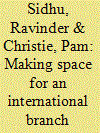

|
|
|
|
|
| Publication |
2014.
|
| Summary/Abstract |
This paper presents findings from an empirical study of an international branch campus established through a partnership between a Malaysian property development conglomerate, the Sunway Group, and Monash University, an Australian university known for its global aspirations. Using Lefebvre's concept of social space we analyse the perceived, conceived and lived spaces that constitute the campus of Monash University Malaysia and its urban setting in the township of Bandar Sunway. Dramatically transformed from a disused mining site and showcased as a 'progressive' urban project, the township symbolises the Sunway Group's commercial success and political pragmatism in managing the dynamics of Malaysia's ethnicised political economy. The broader student experience suggests that the configurations of power that shape ethnic and class relations at the scale of the national are reproduced in the composition of the student body, in students' on-campus interactions and in the rhythms of their everyday lives within the township. By attending to the material, symbolic and imaginary dimensions of one international branch campus, we provide a more nuanced and textured understanding of the globalisation of higher education, highlighting different forms of agency exercised by key actors
|
|
|
|
|
|
|
|
|
|
|
|
|
|
|
|
| 7 |
ID:
134159
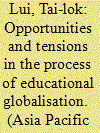

|
|
|
|
|
| Publication |
2014.
|
| Summary/Abstract |
With the rise of Asian economies, university education in the region is no longer just a service to be consumed domestically. It is also perceived as an industry for a rising global city. How to capture the growing market and make the best use of such an opportunity for city building is now on the agenda of many cities in Asia. Hong Kong is a particularly interesting case as it is both a destination for many talented students from China and a bridge for international students to reach different parts (China in particular) of Asia. Educational globalisation seems to make sense politically as well as economically. Yet how to strike a balance between opening the door of universities to the outside world and meeting the education needs of the local population is by no means unproblematic. At stake are further changes in the universities, and major challenges to the political capacity of the government which has to turn higher education into a revenue generating service without doing it at the expense of local interests.
|
|
|
|
|
|
|
|
|
|
|
|
|
|
|
|
| 8 |
ID:
134166


|
|
|
|
|
| Publication |
2014.
|
| Summary/Abstract |
A central theme in the literature on transnational migration is the embeddedness of such movement in social networks and the utilisation of social capital in facilitating mobility. This case study on overseas Chinese students and mainly non-Chinese foreign students studying at a top university in Taipei brings in the notions of cultural capital and city. It investigates the ways social networks shape the destination choices of these two groups of students, and how their patterns of adjustment in the host milieu and attachment to the host city are affected by the transnational migration network (and the lack of it), embodied cultural capital and different host imaginaries constructed by the Taiwan government. The results show that these two groups of international students differed in their reliance on transnational migration networks in making destination choices prior to migration. Furthermore, the different forms of social networks and the differential social and cultural capital embedded in their respective groups, along with the distinctive host images that were constructed by the Taiwan government to cater for these two groups, shaped their overseas experiences and attachment to the city of Taipei in distinctive ways.
|
|
|
|
|
|
|
|
|
|
|
|
|
|
|
|
| 9 |
ID:
134161
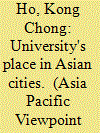

|
|
|
|
|
| Publication |
2014.
|
| Summary/Abstract |
This paper highlights the relationship between the largest cities in East Asia and the comprehensive research universities that are located there. We look at three strands in this relationship. The first involves students and their perception of host cities, which provides a better understanding of student life and how this connects to the social-cultural environment of the city. The second strand examines the relationship between the university and industry, showing how such collaborations represent university products and knowledge spillovers that connect the university to the metropolitan economy. By examining where students plan to go after graduation, the third strand indicates that the city not only receives student migrants studying in metropolitan universities, it also receives graduates from other East Asian universities. Such third country choices (not returning home or staying in the host country) suggest a new after-study mobility and a small but growing pool of students who are likely to remain in East Asia's largest cities after graduation.
|
|
|
|
|
|
|
|
|
|
|
|
|
|
|
|
| 10 |
ID:
134165


|
|
|
|
|
| Publication |
2014.
|
| Summary/Abstract |
This paper analyses the impact the phenomenal growth (2002-2009) and rapid decline (2010-2012) of Indian student numbers has had on the city of Melbourne. Specifically addressing the way the debate developed over the allegedly racially motivated attacks on students in 2009 the paper examines how conflicting narratives on Indian students could emerge presenting them as 'victims' and/or 'profiteers'. Making use of an analysis of over a thousand media reports as well as drawing on ethnographic material the paper argues that the way the debate about the racist character of the attacks unfolded in popular media is revealing of the way the growth in Indian students in Melbourne has been experienced and perceived over time. In particular the entanglement of education and migration in Australia, allowing Indian students to become permanent residents by graduating from low-quality institutions, contributed to the perception of them being low-skilled migrants and as such 'profiteers'. As a result the paper not only shows how a rapidly growing and highly commercial education industry was able to influence the dynamics and socio-cultural make-up of the city of Melbourne but also how the entanglement of education and migration produced a volatile situation with ultimately far reaching social and economic consequences for the city.
|
|
|
|
|
|
|
|
|
|
|
|
|
|
|
|
|
|
|
|
|